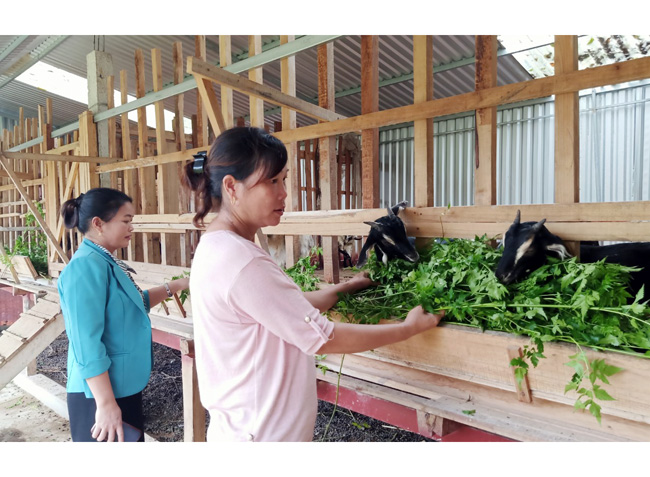(13th Congress) - High level and persistence of poverty among Ethnic Minority (EM) groups presents a key challenge for Viet Nam to achieve the Sustainable Development Goals (SDGs) and ensure leaving no one behind.
The COVID-19 pandemic, as highlighted in UNDP-UN Women rapid assessment of COVID-19 socio-economic impact on the vulnerable households and businesses, disproportionally impacting vulnerable EM households and micro/small enterprises adds significantly to the challenge.
With the partnership and support from the Australia's Department of Foreign Affairs and Trade (DFAT), the UN Development Programme (UNDP) and the Committee for Ethnic Minorities Affairs (CEMA) launched a project today to provide policy advice and technical support to the CEMA and participating provinces to realize the objective of the National Targeted Program to reduce the number of the communes with extreme hardship by 50% by 2025 and basically bring the number to zero by 2030.
 |
|
Photo: Internet
|
Recognizing this, the Government has identified acceleration of multidimensional poverty reduction and social economic development in Ethnic Minority and Mountainous areas as a key priority in the country’s Socio-Economic Development Plan. The Government has the ambition for the National Targeted Program on Socioeconomic Development in Ethnic Minority and Mountainous areas for the 2021 – 2030 period (NTP) to make breakthroughs in accelerating of socio-economic development in EM and mountainous areas in the next 10 years.
UNDP Resident Representative Caitlin Wiesen highlighted the shared views of CEMA, National Assembly, participating provinces of Lao Cai and Son La, DFAT and Gender-Responsive Equitable Agriculture and Tourism (GREAT) program, CARE, that “the NTP’s expected breakthroughs can be made by the central level providing more spaces for mobilizing local governments’ and EM women’s and men’s strengths, and for experimenting and scaling up innovative solutions”.
At the national level the project “Accelerating socio-economic development and multi-dimensional poverty reduction among Ethnic Minorities in Viet Nam in the 2020-2025 period” will support the creation of (i) spaces for innovation and (ii) a system for providing incentives and holding accountability for the achievement of the Program’s outcomes, which is expected to be a significant shift from the current system where compliance to rigid rules and delivery of outputs are emphasized.
At the local level, in Son La and Lao Cai provinces will support EM women and men, local governments and private enterprises in identifying and experimenting innovative solutions and implementing the successfully tested solutions to accelerate multidimensional poverty reduction at scales.
This work of the project will build on the successes of UNDP work in Bac Can and Dak Nong through which EM women-led cooperatives successfully applied e-commerce, e-marketing and e-payment tools and advantages of the local traditional and organic products to expand their businesses during the difficult time of COVID-19 pandemic.
Such new business models also enabled the EM women-led to be ready for the coming digital transformation and socio-economic recovery. The project will also build on GREAT Program’s pilots for example on ecotourism and connecting EM women in market service systems in Son La and Lao Cai and other pilots of other development partners.
Ms. Robyn Mudie, Ambassador of Australia to Viet Nam, said: “Australia is committed to working with partners to support sustainable and inclusive growth of Vietnam. The UNDP- CEMA partnership that we support and kick-off today is part of this long term commitment to make sure that new and innovative solutions in poverty reduction are embedded into and scaled up by Government’s program and policies for the benefit of poor and disadvantaged people, including women and men from ethnic minority groups”.
Following the signing ceremony of the project, participants shared “Innovative solutions for accelerating socio-economic development and multi-dimensional poverty reduction among Ethnic Minorities”.
The events were co-chaired by the leaders of CEMA, UNDP and Australian Embassy, with the participation of representatives from line ministries; ethnic minority women cooperatives from Lao Cai, Son La, Bac Kan and Dak Nong provinces; development partners; enterprises; academia and mass media organizations.
EM women from Bac Can, Dak Nong, Lao Cai and Son La provinces shared lessons on how their inter strengths have been mobilized, how concrete innovative solutions have been generated and helped them escape poverty.
“I strongly believe that the shared development vision, the committed and innovation nurturing government, innovative EM people will make the NTP a powerful tool for accelerating socio-economic development of EM areas and communities, and leaving no one behind,” said Ms Caitlin Wiesen. “We stand ready to cooperate with CEMA, line ministries, agencies and selected provinces, to support Government of Viet Nam and EM people in this essential important endeavor”.
Khac Kien